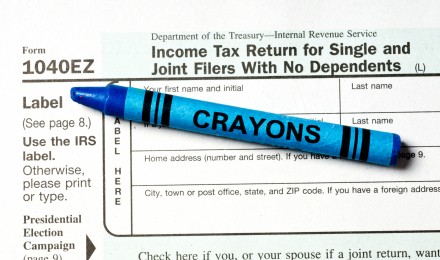That all depends on who you call an expert and just how complicated your taxes really are.
Although I can relate to the feeling of wanting to turn everything over to somebody else and not bother, I know how expensive a mistake that can be. Regardless of how complicated your taxes are, it pays to know something about the process in order to protect yourself. In spite of what “peace of mind” coverage you think you have purchased, ultimately the buck will stop with you.
These days, most everyone preparing taxes for a living uses software to do the calculations. This includes CPAs, Accountants, bookkeepers; the rapid refund tax preparation franchises– they all use software.
What’s more, if they do use software or they are a company that sells tax software, the software has passed inspection by the IRS and certified as correct. And, when I say correct, it only means that the software performs the correct mathematical calculations when the correct figures are entered.
This is all that the 100% guarantee advertised by software companies means: if you enter the correct figures in the right place, then the software will do the right math. Just as a calculator will give an answer of four when you enter 10-6, the calculator will also give the answer of 94 if you enter 100-6.
The difference, of course, is that tax software is very good at figuring complex formulas for such things as depreciation and monitoring these figures from year to year. Finding out just how well my software performed was a very expensive lesson I learned one year.
I had been running a small direct mail graphic design company for a number of years using a popular bookkeeping program and the same company’s tax software to do my taxes. Even though I was very diligent about reading all of the reference material provided by the program before entering the information each year, I grew uneasy about my qualifications and decided to have my taxes checked over by a local accounting firm.
Of course, in order to begin to check my taxes, the firm had to input all of my information into their “professional” software. I learned, $600 later, that their software said the same thing as mine. I guess it was worth knowing I was doing it right but I really chafed at the idea of paying $600 for the information.
My point to all this is that tax software is tax software, the difference being the person entering the information’s understanding of what goes where.
This leads me to my next point. Does working for a rapid refund franchise preparing taxes for the public qualify a person as an expert? Again, that depends entirely on the person.
I know from a source very close to me just how these “experts” are hired and trained each year. A look at just one website of consumer’s complaints about any of the income tax franchises should be enough to answer that question.
The fact is, it is simply a good idea to either know what experience your tax preparer has, know enough about the process to check over the return or better yet learn to do it yourself using software you can get for free, or buy off the shelf.
Should you do your own taxes or take your information to an expert? The answer depends entirely on how much you know and who your “expert” is.
That all depends on who you call an expert and just how complicated your taxes really are.
Although I can relate to the feeling of wanting to turn everything over to somebody else and not bother, I know how expensive a mistake that can be. Regardless of how complicated your taxes are, it pays to know something about the process in order to protect yourself. In spite of what “peace of mind” coverage you think you have purchased, ultimately the buck will stop with you.
These days, most everyone preparing taxes for a living uses software to do the calculations. This includes CPAs, Accountants, bookkeepers; the rapid refund tax preparation franchises– they all use software.
What’s more, if they do use software or they are a company that sells tax software, the software has passed inspection by the IRS and certified as correct. And, when I say correct, it only means that the software performs the correct mathematical calculations when the correct figures are entered.
This is all that the 100% guarantee advertised by software companies means: if you enter the correct figures in the right place, then the software will do the right math. Just as a calculator will give an answer of four when you enter 10-6, the calculator will also give the answer of 94 if you enter 100-6.
The difference, of course, is that tax software is very good at figuring complex formulas for such things as depreciation and monitoring these figures from year to year. Finding out just how well my software performed was a very expensive lesson I learned one year.
I had been running a small direct mail graphic design company for a number of years using a popular bookkeeping program and the same company’s tax software to do my taxes. Even though I was very diligent about reading all of the reference material provided by the program before entering the information each year, I grew uneasy about my qualifications and decided to have my taxes checked over by a local accounting firm.
Of course, in order to begin to check my taxes, the firm had to input all of my information into their “professional” software. I learned, $600 later, that their software said the same thing as mine. I guess it was worth knowing I was doing it right but I really chafed at the idea of paying $600 for the information.
My point to all this is that tax software is tax software, the difference being the person entering the information’s understanding of what goes where.
This leads me to my next point. Does working for a rapid refund franchise preparing taxes for the public qualify a person as an expert? Again, that depends entirely on the person.
I know from a source very close to me just how these “experts” are hired and trained each year. A look at just one website of consumer’s complaints about any of the income tax franchises should be enough to answer that question.
The fact is, it is simply a good idea to either know what experience your tax preparer has, know enough about the process to check over the return or better yet learn to do it yourself using software you can get for free, or buy off the shelf.
Should you do your own taxes or take your information to an expert? The answer depends entirely on how much you know and who your “expert” is.







